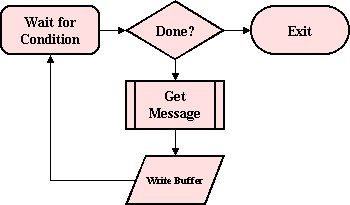Prolix is designed to be a fairly simple bot with a few exceptions.
The threading model to Prolix is certainly one of those exceptions.
There are several different possible threading approaches:
- Single Thread - Nonblocking
A single task without threads and completly non-blocking is
a very efficient solution. zDSBot3 was like this, as the only
thing that blocked was the DNS lookups.
thttpd is a
webserver that uses this same method.
- Thread per Bot
This is actually a fairly decent solution. It is easy to implement,
and keeps one bot from interfering with another bot. This model
obviously has problems when using a large number of bots, as each
bot gets it's own thread. This can be cleaned up so the bot runs
some number n threads per thread.
- Thread per System
This is a interesting approach as each "system" (ex: saving/networking/dns)
runs in it's own thread. This model involves some overhead as messages
must be passed between each thread, for example - the bot would like
to send a packet, so it must pass the packet to the network thread.
zDSBot3 uses the first model, and there are several windows bots that
use the second model. Prolix uses the third model (which fits well with
the name).
Master Thread
The "master thread" or the initial thread the program starts up on
is responsible for starting all the other threads. When prolix
closes, the master thread waits for all threads to be finished.
init all threads
wait for mutex_quit
wait for all threads to quit
Bot Thread
The Bot Thread runs ALL of the bots in it. In the future each bot module
will be ran in it's own thread, but multiple bots of the same bot module
will exist in the same thread.
The bot thread calls the handler for each individual bot. Each bot
in turn checks to see if it has any packets waiting.
wait for mutex or timeout
if mutex bothandler
if idletime botidlehandler
Net - isConnected, isConnecting, Connect (All non-blocking)
poll
if signal
handleCommanQueue();
if ISSET( net[i]->fd)
net[i]->handler();
DNS
// getIP - 0 ok, -1 busy, -2 unable to resolve
if mutex
lookup host
Config (handles all database related saving)
wait for mutex
load/save
The Log Thread
 The log thread (short of the main thread) is
the simplest thread in prolix. The log thread
takes simple messages and appends them to a
disk file in it's own leisure. The log thread
is capable of handling multiple different log
files at once. This allows for different modules
to use seperate log files as they choose. The
actual enqueue is done in the thread of the log
caller, and then is written to disk in the log
thread.
The log thread (short of the main thread) is
the simplest thread in prolix. The log thread
takes simple messages and appends them to a
disk file in it's own leisure. The log thread
is capable of handling multiple different log
files at once. This allows for different modules
to use seperate log files as they choose. The
actual enqueue is done in the thread of the log
caller, and then is written to disk in the log
thread.
|
Auth Thread
 The auth thread handles all of the time consuming
aspects of the auth equation. This consists of
a couple million math operations per login.
The auth thread handles all of the time consuming
aspects of the auth equation. This consists of
a couple million math operations per login.
|
Display
 The log thread (short of the main thread) is
the simplest thread in prolix. The log thread
takes simple messages and appends them to a
disk file in it's own leisure. The log thread
is capable of handling multiple different log
files at once. This allows for different modules
to use seperate log files as they choose. The
actual enqueue is done in the thread of the log
caller, and then is written to disk in the log
thread.
The log thread (short of the main thread) is
the simplest thread in prolix. The log thread
takes simple messages and appends them to a
disk file in it's own leisure. The log thread
is capable of handling multiple different log
files at once. This allows for different modules
to use seperate log files as they choose. The
actual enqueue is done in the thread of the log
caller, and then is written to disk in the log
thread.
 The auth thread handles all of the time consuming
aspects of the auth equation. This consists of
a couple million math operations per login.
The auth thread handles all of the time consuming
aspects of the auth equation. This consists of
a couple million math operations per login.